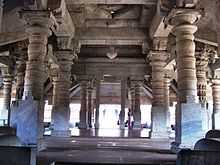Saavira Kambada Basadi
| Sāvira Kambada Temple | |
|---|---|
|
Sāvira Kambada Temple, Karnataka | |
| Name | |
| Other names: | Tribhuvana Tilaka Cūḍāmaṇi |
| Devanagari: | त्रिभुवन तिलक चूडामणि |
| Location | |
| Country: | India |
| State/province: | Karnataka |
| District: | Moodabidri |
| Architecture and culture | |
| Primary deity: | Chandraprabha |
| Number of temples: | 18 |
| History | |
| Date established: | 1430 AD |
| Bhattaraka: | Charukeerti Panditacharya Varya |
| Governing body: | Shri Moodabidri Jain Matha |
| Website: | www.jainkashi.com |
| Part of a series on |
| Jainism |
|---|
 |
|
Jain Prayers |
|
Major figures |
|
Major Sects |
|
Festivals |
| Jainism portal |
Saavira Kambada Temple' (Tulu: ಸಾವಿರ ಕಂಬದ ಬಸದಿ Sāvira Kambada Basadi) or Tribhuvana Tilaka Cūḍāmaṇi (Sanskrit: त्रिभुवन तिलक चूडामणि), is a basadi (ಬಸದಿ or Jain temple noted for its 1000 pillars in Moodabidri, Karnataka, India. The temple is also known as "Chandranatha Temple" since it honors the tirthankara Chandraprabha, whose eight-foot idol is worshipped in the shrine.[1]
The town of Moodabidri is noted for its eighteen Jain temples but Saavira Kambada Temple is considered the finest among them.[2]
History
The Basadi was built by the [vijayanagarkingdom] ruler Devaraya Wodeyar in 1430 with additions made in 1962, this shrine has a 60 feet tall monolith manasthambha (erected by karkala bhairava Queen Nagala Devi).[1]
Other Jain Temples in Moodabidri
Moodabidri is noted for its 18 Jains Temples-
- Vikram Shetty Basadi
- Mahadeva Shetty Basadi
- Chola Shetty Basadi
- Koti Shetty Basadi
- Derma Shetty Basadi
- Ammanavara Basadi
Guru Basadi
Guru basadi is the earliest of the Jain monuments. A stone idol of Parshwanatha, about 3.5 metres tall, is installed in the sanctum of this basadi. Here the rare Jain palm leaf manuscripts of 12th century A.D. known as ‘Dhavala texts’ are preserved. This basadi was stolen on 6 July 2013 where the 15 golden idols were stolen.[3]
Moodabidri Jain Math
There is a matha at Moodabidri responsible for the upkeep and maintenance of temples in Moodabidri.[4] It is known as the Jain Varanasi of the South.[5][6]
Bhaṭṭāraka Charukeerthi
A bhaṭṭāraka seat exists at Moodabidri responsible for administering the 18 temples at Moodabidri and the other temples in the surrounding areas. The name given to the bhaṭṭāraka of Moodabidri is Charukeerthi.[4][7][8]
Photo Gallery
-

Manastambha of the Basadi
-
The right side view of the Basadi
-
The left side view of the Basadi
-

Inside panorama
-

Inner view panorama from the left hand side
-

Pillars inside the basadi
See also
| Wikimedia Commons has media related to 1000 Pillar Temple (Moodabidri). |
Notes
- ↑ 1.0 1.1 "Moodbidri — woods of yore". Online Edition of The Hindu, dated 2005-04-24 (Chennai, India). 2005-04-24. Retrieved 2008-01-25.
- ↑ Pratyush Shankar. "FRAMEWORK FOR UNDERSTANDING MOODABIDRI TEMPLES AS PUBLIC PLACES" (PDF). 15 January 2006. CEPT University, Ahmedabad, India. Retrieved 4 January 2012.
- ↑ http://www.deccanchronicle.com/130709/news-current-affairs/article/idol-theft%E2%80%88karnataka-robbed-history
- ↑ 4.0 4.1 Special Correspondent (2012-12-10). "Jain festival begins in Moodbidri". The Hindu. Retrieved 2013-07-13.
- ↑ "Jainism in Southern Karnataka: (up to AD 1565) - Shakuntala Prakash Chavan - Google Books". Books.google.com. Retrieved 2013-07-13.
- ↑ "Serving Mangaloreans Around The World!". Mangalorean.Com. Retrieved 2013-07-13.
- ↑ "Rooting for heritage tag for Moodbidri - Bangalore - DNA". Dnaindia.com. Retrieved 2013-07-13.
- ↑ Chavan, Mahavir S. (2010-08-11). "Jain News: Moodbidri Jain Swamiji calls for removal of ignorance". Jainsamachar.blogspot.com. Retrieved 2013-07-13.
| ||||||||||||||||||||||||||||||||||||||||||||||||||||||||||||||||||


